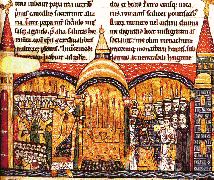 Today we celebrate the feast of five great Benedictine saints, all abbots of Cluny, France. Much of their writing are lost to us but during their time Cluny was the mother house of over 1,000 other Benedictine monasteries. The monasteries and convents they founded ranged across western Europe from England to Spain, to France, Germany and Italy. From these men comes the spread of the Benedictine Rule to all Europe. From St. Odo comes the “Truce of God” ending, through the influence of the Church, the continuous warefare between nobles. The monasteries and convents they founded maintained huge libraries which kept the light of learning alive during the Middle Ages.
Today we celebrate the feast of five great Benedictine saints, all abbots of Cluny, France. Much of their writing are lost to us but during their time Cluny was the mother house of over 1,000 other Benedictine monasteries. The monasteries and convents they founded ranged across western Europe from England to Spain, to France, Germany and Italy. From these men comes the spread of the Benedictine Rule to all Europe. From St. Odo comes the “Truce of God” ending, through the influence of the Church, the continuous warefare between nobles. The monasteries and convents they founded maintained huge libraries which kept the light of learning alive during the Middle Ages.
If you would like to read more about their lives and their influence, one book that might be of interest is Cluny, In Search of God’s Lost Empire. The book was an excellent expose’ of the history of the Clunic branch of the Benedictine Order. Within this short volume (only 245 pages in including footnotes and index) the author brings to life the art and architecture of the Order and their major impact on the history of Europe and the Church during the Middle Ages. While the author is not too kind toward St. Bernard, it is still a good book, unhampered by previously written histories. Edwin Mullins, the author, also takes great pains to describe the great Abbey, possibly one of the largest churches ever built. Not the typical history book, Mullins brings alive Cluny and makes one wish the monastery at not been destroyed during the French Revolution and was still standing so we could also enjoy it today.
On this great feast day perhaps we can remember them best by remembering the words of St. Odo when he went to correct the wayward monks at St. Benoit:
“I come peacefully, to hurt no one, injure no one, only that I may convert those who are not living according to the Rule.”
